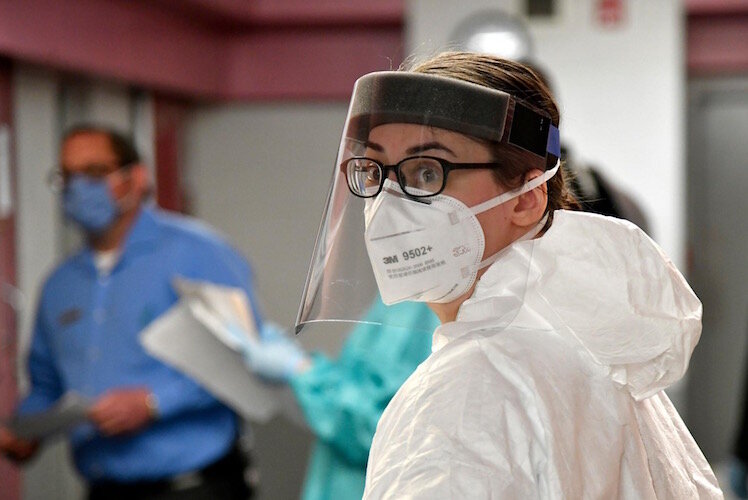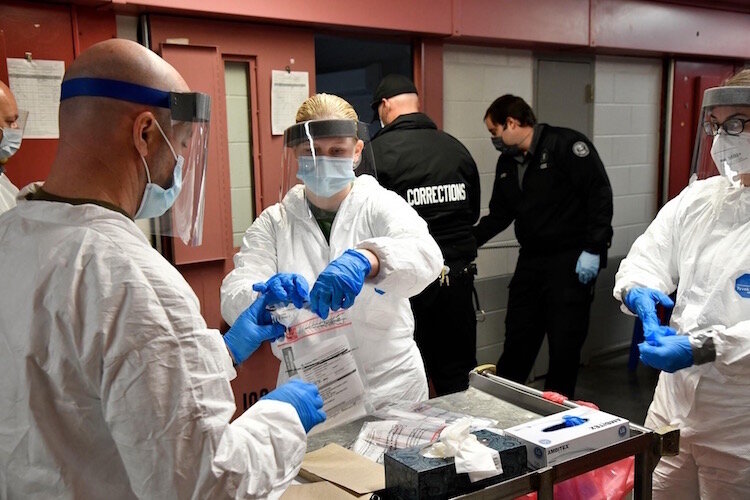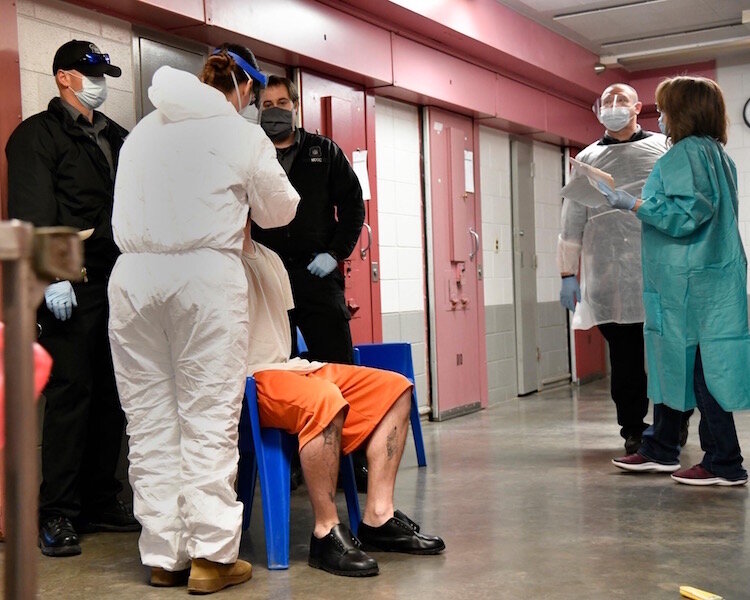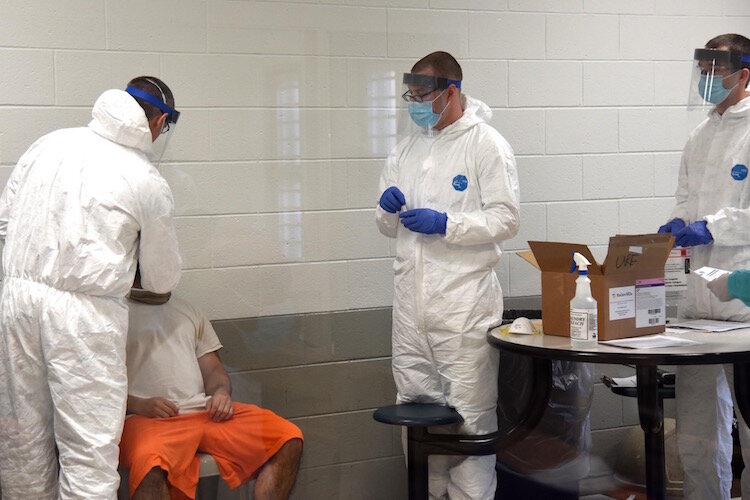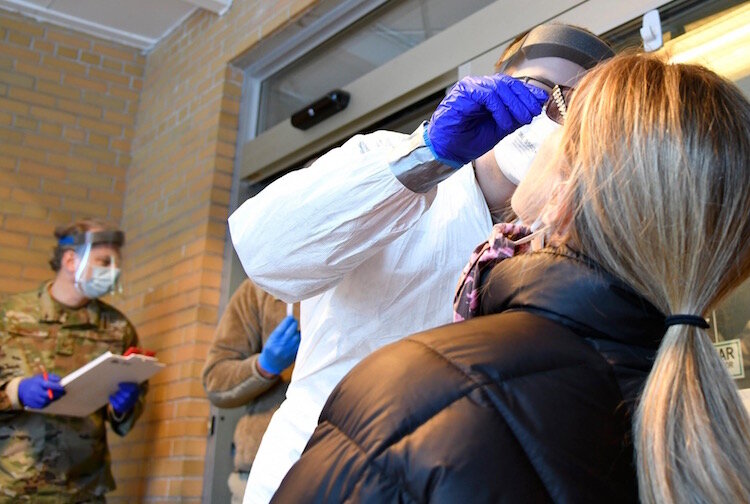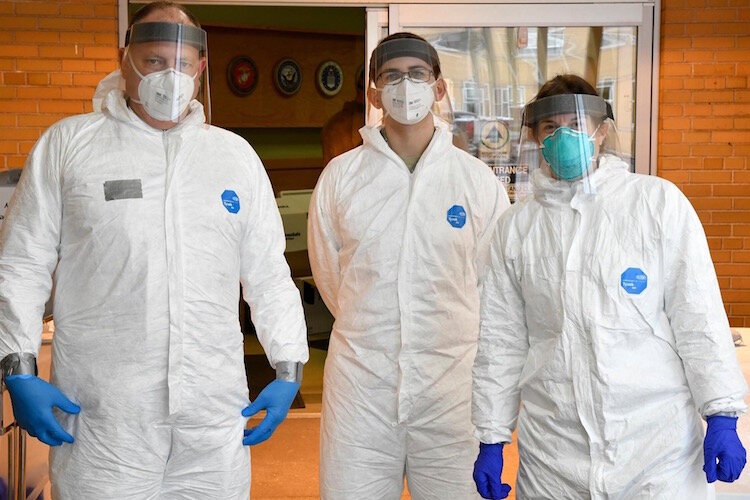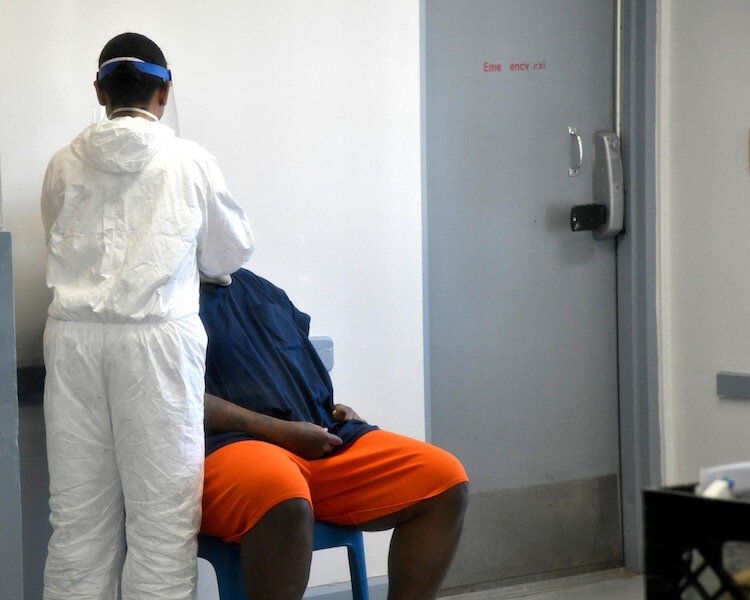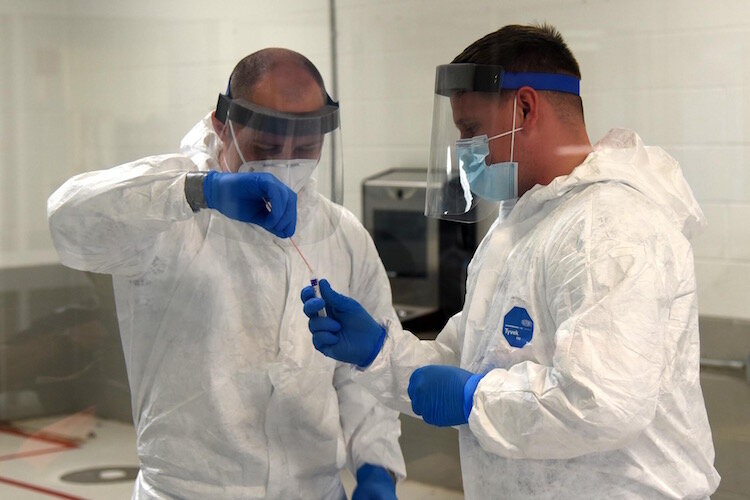National Guard medic from Battle Creek helps with COVID-19 testing of Michigan’s incarcerated
Inmates across the state are being tested for COVID-19 by Michigan National Guards. Battle Creek resident Claire Tribbett is part of the team.
Editor’s note: This story is part of Southwest Michigan Second Wave’s On the Ground Battle Creek series.
Claire Tribbett’s latest deployment with the Michigan Army National Guard has taken her to prisons and county jails throughout Michigan’s Upper and Lower Peninsulas where she has been part of a team assigned to test inmates for COVID-19.
A Medic with the Army National Guard, Tribbett, 23, who lives in Battle Creek, says she received her orders on March 28. Her first stop was in Lansing where she took the temperatures of soldiers who were on missions to assist at area food banks and also were setting up hospitals and medical care in Detroit. Following that stop, she embarked on a mission to test inmates for the virus.
She and her team began their testing May 1 and they completed the work within one week at all six prisons to which they were assigned. This work took her to cities including Gaylord, Houghton, Ishpeming, Lapeer, and Marquette.

“We had to practice on ourselves quite a few times before we did a test on other people,” Tribbett says.
While there was some anxiety on her part about how the inmates would respond to her and the actual testing, she says everything went smoothly.
“The nasal swab used in the testing is uncomfortable and it kind of feels like you’re drowning,” Tribbett says. “I tested probably 600 or 700 prisoners and I never had anyone say anything rude to me. I work in healthcare in my civilian life and the prisoners were better behaved than some of the patients I’ve seen.”
Inmates could opt out of taking the test, but the consequence for that decision was having some of their privileges taken away. Tribbett says very few opted out. Of those who were tested by her and her team, no one came back positive for the virus.
During briefings with guards and correctional officers, Tribbett says her team was told that the inmates were concerned about their health.
“Obviously it’s not enjoyable to have this testing done, but we’re doing a good thing for the community,” she says. “Mass testing helps us to know what’s going on in the community. We’re beginning to see a re-opening of some areas of the state because these areas have fewer numbers of COVID cases. Hopefully, if there’s a second wave, we’ll be better prepared to do the testing.”
Besides the COVID-19 testing, Tribbett says she also has been doing antibody testing, which has been a learning opportunity for her.
Since completing their work in the prisons, Tribbett’s team has been conducting tests at various locations across the state. They have tested those in county jails in the Upper Penninsula and staffed drive-up test sites in Mackinaw City, for example.
Throughout the COVID-19 testing, Tribbett says she hasn’t worried for her own safety because she has access to adequate supplies of Personal Protection Equipment and has been trained in the proper procedures and precautions. “We’ve had plenty of PPE (Personal Protection Equipment) like full Tyvek suits, gloves, masks, and face shields and the prison staff has been great about wiping down chairs in between inmates.”
She does worry about potentially spreading the virus to her parents who are older and says she knows of soldiers who have gotten the virus from a spouse. She says initially she did not let her parents know about her assignment at the prisons because she knew they’d be concerned.
“I was originally a little more worried for myself, but the numbers up here have been so minimal,” she says of northern Michigan and the U.P. “If I was in Detroit, I would be a little more worried.
“I signed up to do my job. If there’s any kind of disaster in the state of Michigan, that’s part of what I signed up for.”
However, she does admit that the constant change she’s been experiencing lately has been challenging. And as the military is being called in to face protesters in some cities, she does not know what her next deployment will be.
“The hardest part is not knowing what’s going on next and we don’t know until the night before (where they will be deployed). It’s hard not having a set schedule and there’s a lot of anxiety because of that,” Tribbett says. “I want home-cooked food. I miss not seeing my family and I miss my dog.
“It’s just the constant change and being able to adjust to that. Everyone wants to get back to normal.”
While she heard early on about a disease coming from abroad, she says she had no idea about how “big of a deal” it would be or what the response would look like.
She says she never expected to be called to work during a pandemic. “But, we were also called up to help with the Flint water crisis, which is also something we didn’t foresee.
“I think all members of my team are taking this seriously,” she adds.
For now, her team’s assignment has been extended to June 24 but may be extended again after President Trump on June 2 approved a request made by Gov. Whitmer on May 28. That request sought an extension of Title 32 authority in order to use Michigan National Guard forces to combat the spread of COVID-19 through July 31.
Title 32 status provides for federal pay and benefits and was originally authorized by the President through June 24.
“The Michigan National Guard,” Governor Whitmer says, “has been instrumental in flattening the COVID-19 curve in Michigan by performing testing throughout the state, distributing Personal Protective Equipment, food, and medical supplies, providing warehousing support, disinfecting public spaces, and assisting the Department of Health and Human Services with testing.
“I’m requesting an extension to continue utilizing the Michigan National Guard so we can safely reopen our economy while putting the health and well-being of all Michiganders first.”
Tribbett was in Alpena on Tuesday, June 2, and preparing to head to Lansing on Wednesday. She says she doesn’t know where she’ll be going next. In addition to these unknowns, she’s also dealing with the collateral damage caused by the pandemic.
It saddens her to see how many people have lost their jobs as a result of the pandemic and state-mandated orders and she says she considers herself lucky to be working. She was laid off from her civilian job with a medical facility in Battle Creek when Gov. Whitmer ordered non-essential businesses and organizations to close.
“This whole experience has made me completely humble,” Tribbett says. “I feel for people who are losing their livelihoods and for people who have lost their loved ones to this virus. I feel like this will change things for a long while.”

